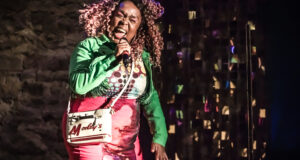Pros: Confronts a few difficult topics with courage. Works hard to maintain visual interest.
Cons: Sequences of very stilted dialogue, some monologues felt artificial.
Summary
Rating
Good
A mixed bag - the portrayal of a gay relationship in the army worked, but the portrayal of war left a lot to be desired.
The space at the newly revived Drayton Theatre is an interesting one. I have been to it before, all kitted out for a farce. But this time it was stripped to its bare bones, exposing a space somewhat akin to an old loft, complete with several cardboard boxes. These boxes become storage spaces for props, props themselves and scenery. In a play so pre-occupied with memory (we start and end with the protagonist, dressing gown clad and reminiscing), the setting works perfectly.
The play begins and we are thrust into the world of British soldiers in the NATO Peacekeeping troops. Ian and John are two soldiers from different classes, backgrounds and personalities who find themselves drawn to each other. The audience don’t see their “courting”, or falling for each other, but join the pair three weeks from their tour ending, counting down the days until they can leave the Forces and be with each other properly. The working-class John struggles to identify with the locals they have been tasked with helping, but is taught compassion by the more middle-class Ian, who feels a genuine connection to the Kosovo people.
Ian and John (Ben Carpenter and Matthew Schmolle) are joined by newbie Paul and old-hat Simon as they retell the story of their final weeks in the conflict. Paul (River Hawkins) and Simon (Nicholas Waters) are perhaps meant to show the other side – the “squaddie”/ “lad” version of events. However, their dialogue is stilted in both its delivery and writing and feels awkward. Their perspective only becomes more irrelevant as they are killed two-thirds into the piece. The audience feel a palpable (but terrible and guilty) sense of relief as Paul and Simon’s names are read out as the deaths on the news report.
I was relieved to return from the character’s experience of war back to the relationship of John and Ian, for this is the real core of the play. Indeed the play’s most poignant moments surrounds a letter written by the usually inarticulate and gruff John where he expresses his deep love for Ian. The reply Ian gives after the love story’s tragic end lingered with me long after the play’s close.
The plot isn’t all that unpredictable, but is executed well enough to have the audience invested; Schmolle is particularly compelling as the rough-around-the-edges John who softens under Ian’s companionship. There are some nice staging moments for which director Hamish MacDougall deserves plaudits, especially striking was the re-enactment of the rape and torture of locals by British soldiers as Ian recounts the story to John. Another strong moment is the beginning, which shows Ian and John simultaneously recounting a mission. The contrast between an eloquent and compassionate Ian versus an uneducated and disdainful John are well accentuated by their positioning on stage.
Yesterday’s Tomorrow, while nothing groundbreaking, is worth seeing for the relationship it explores between two men loving each other in an environment that makes it difficult and even dangerous to do so. If you are looking for a stirring representation of war, this is not it; but if that’s your thing, there are plenty of war stories to choose from this year so the next one will be along very shortly.
Author: Gene David Kirk
Director: Hamish MacDougall
Producer: PostScript Theatre
Box Office: 020 7835 2301
Booking Link: http://www.ticketsource.co.uk/search/searchVenue.asp?venue_id=61085
Booking Until: 31st May
 Everything Theatre Reviews, interviews and news for theatre lovers, London and beyond
Everything Theatre Reviews, interviews and news for theatre lovers, London and beyond


